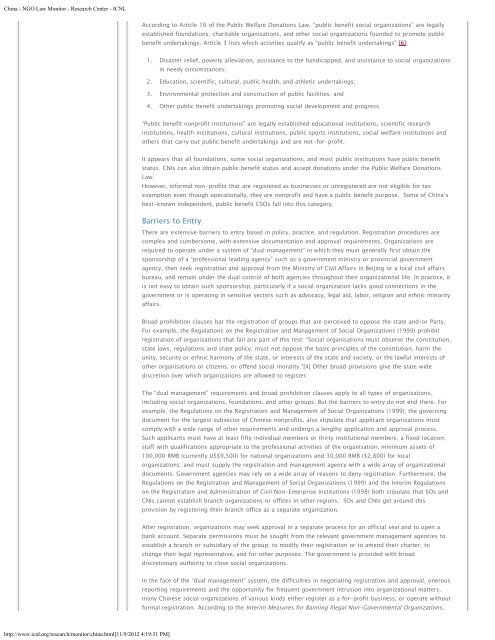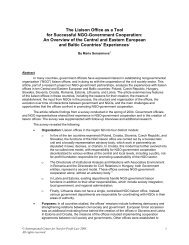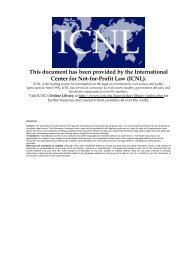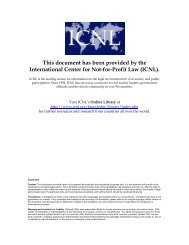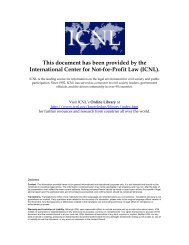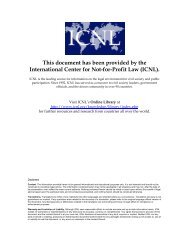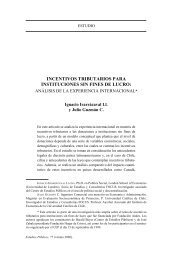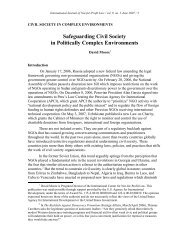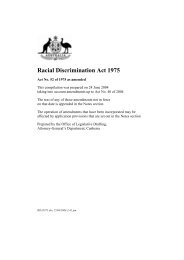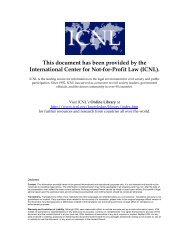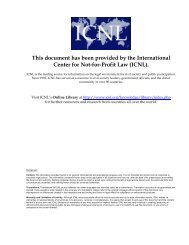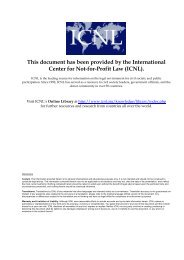NGO Law Monitor: China RESEARCH CENTER - The International ...
NGO Law Monitor: China RESEARCH CENTER - The International ...
NGO Law Monitor: China RESEARCH CENTER - The International ...
You also want an ePaper? Increase the reach of your titles
YUMPU automatically turns print PDFs into web optimized ePapers that Google loves.
<strong>China</strong> - <strong>NGO</strong> <strong>Law</strong> <strong>Monitor</strong> - Research Center - ICNL<br />
http://www.icnl.org/research/monitor/china.html[11/9/2012 4:19:31 PM]<br />
According to Article 10 of the Public Welfare Donations <strong>Law</strong>, “public benefit social organizations” are legally<br />
established foundations, charitable organizations, and other social organizations founded to promote public<br />
benefit undertakings. Article 3 lists which activities qualify as “public benefit undertakings" [6]:<br />
1. Disaster relief, poverty alleviation, assistance to the handicapped, and assistance to social organizations<br />
in needy circumstances;<br />
2. Education, scientific, cultural, public health, and athletic undertakings;<br />
3. Environmental protection and construction of public facilities; and<br />
4. Other public benefit undertakings promoting social development and progress.<br />
“Public benefit nonprofit institutions” are legally established educational institutions, scientific research<br />
institutions, health institutions, cultural institutions, public sports institutions, social welfare institutions and<br />
others that carry out public benefit undertakings and are not-for-profit.<br />
It appears that all foundations, some social organizations, and most public institutions have public benefit<br />
status. CNIs can also obtain public benefit status and accept donations under the Public Welfare Donations<br />
<strong>Law</strong>.<br />
However, informal non-profits that are registered as businesses or unregistered are not eligible for tax<br />
exemption even though operationally, they are nonprofit and have a public benefit purpose. Some of <strong>China</strong>’s<br />
best-known independent, public benefit CSOs fall into this category.<br />
Barriers to Entry<br />
<strong>The</strong>re are extensive barriers to entry based in policy, practice, and regulation. Registration procedures are<br />
complex and cumbersome, with extensive documentation and approval requirements. Organizations are<br />
required to operate under a system of “dual management” in which they must generally first obtain the<br />
sponsorship of a “professional leading agency” such as a government ministry or provincial government<br />
agency, then seek registration and approval from the Ministry of Civil Affairs in Beijing or a local civil affairs<br />
bureau, and remain under the dual control of both agencies throughout their organizational life. In practice, it<br />
is not easy to obtain such sponsorship, particularly if a social organization lacks good connections in the<br />
government or is operating in sensitive sectors such as advocacy, legal aid, labor, religion and ethnic minority<br />
affairs.<br />
Broad prohibition clauses bar the registration of groups that are perceived to oppose the state and/or Party.<br />
For example, the Regulations on the Registration and Management of Social Organizations (1999) prohibit<br />
registration of organizations that fail any part of this test: “Social organisations must observe the constitution,<br />
state laws, regulations and state policy; must not oppose the basic principles of the constitution, harm the<br />
unity, security or ethnic harmony of the state, or interests of the state and society, or the lawful interests of<br />
other organisations or citizens, or offend social morality.”[4] Other broad provisions give the state wide<br />
discretion over which organizations are allowed to register.<br />
<strong>The</strong> “dual management” requirements and broad prohibition clauses apply to all types of organizations,<br />
including social organizations, foundations, and other groups. But the barriers to entry do not end there. For<br />
example, the Regulations on the Registration and Management of Social Organizations (1999), the governing<br />
document for the largest subsector of Chinese nonprofits, also stipulate that applicant organizations must<br />
comply with a wide range of other requirements and undergo a lengthy application and approval process.<br />
Such applicants must have at least fifty individual members or thirty institutional members; a fixed location;<br />
staff with qualifications appropriate to the professional activities of the organisation; minimum assets of<br />
100,000 RMB (currently US$9,500) for national organizations and 30,000 RMB ($2,800) for local<br />
organizations; and must supply the registration and management agency with a wide array of organizational<br />
documents. Government agencies may rely on a wide array of reasons to deny registration. Furthermore, the<br />
Regulations on the Registration and Management of Social Organizations (1999) and the Interim Regulations<br />
on the Registration and Administration of Civil Non-Enterprise Institutions (1998) both stipulate that SOs and<br />
CNIs cannot establish branch organizations or offices in other regions. SOs and CNIs get around this<br />
provision by registering their branch office as a separate organization.<br />
After registration, organizations may seek approval in a separate process for an official seal and to open a<br />
bank account. Separate permissions must be sought from the relevant government management agencies to<br />
establish a branch or subsidiary of the group; to modify their registration or to amend their charter; to<br />
change their legal representative, and for other purposes. <strong>The</strong> government is provided with broad<br />
discretionary authority to close social organizations.<br />
In the face of the “dual management” system, the difficulties in negotiating registration and approval, onerous<br />
reporting requirements and the opportunity for frequent government intrusion into organizational matters,<br />
many Chinese social organizations of various kinds either register as a for-profit business, or operate without<br />
formal registration. According to the Interim Measures for Banning Illegal Non-Governmental Organizations,


